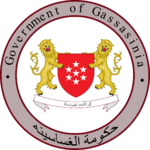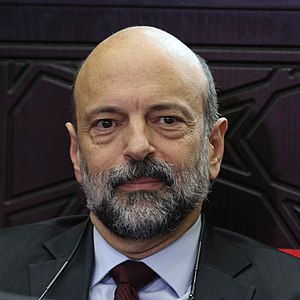Prime Minister of Gassasinia: Difference between revisions
No edit summary |
No edit summary |
||
| Line 11: | Line 11: | ||
| seat = Government House of Gassasinia, Jabalah, [[Jabiyah]] | | seat = Government House of Gassasinia, Jabalah, [[Jabiyah]] | ||
| appointer = Gassasinian Parliament | | appointer = Gassasinian Parliament | ||
| termlength = Four Years, Renewable | | termlength = Four Years, Renewable Indefinitely | ||
| constituting_instrument = Constitution of Gassasinia Act 1979 | | constituting_instrument = Constitution of Gassasinia Act 1979 | ||
| formation = 1st of March, 1949 | | formation = 1st of March, 1949 | ||
| Line 22: | Line 22: | ||
The '''prime minister of Gassasinia''' is the {{wp|head of government}} of the [[Gassasinia|State of Gassasinia]]. Gassasinian prime ministers are responsible for forming the Cabinet, and for leading the privy council which, amongst other duties, appoints members of the House of Peers. Although the prime minister cannot nominate peers, he can veto privy council nominations for the House of Peers. Prime ministers are {{wp|Style (form of address)|styled}} as {{wp|The Right Honourable}}, a privilege which remains even after they have left office. | The '''prime minister of Gassasinia''' is the {{wp|head of government}} of the [[Gassasinia|State of Gassasinia]]. Gassasinian prime ministers are responsible for forming the Cabinet, and for leading the privy council which, amongst other duties, appoints members of the House of Peers. Although the prime minister cannot nominate peers, he can veto privy council nominations for the House of Peers. Prime ministers are {{wp|Style (form of address)|styled}} as {{wp|The Right Honourable}}, a privilege which remains even after they have left office. | ||
Gassasinian prime ministers are, as a matter of convention, almost always nominated to the House of Peers. However, as peers must be non-partisan, many former prime ministers opt to remain members of the House of Representatives. | Former Gassasinian prime ministers are, as a matter of convention, almost always nominated to the House of Peers. However, as peers must be non-partisan, many former prime ministers opt to remain members of the House of Representatives. | ||
The prime minister of Gassasinia is generally appointed by parliamentary vote from the largest party of parliament. Prime ministers in Gassasinia can be recalled by parliament through a {{wp|motion of no confidence}}, and can be {{wp|impeached}} by the Supreme Court of Gassasinia. | The prime minister of Gassasinia is generally appointed by parliamentary vote from the largest party of parliament. Prime ministers in Gassasinia can be recalled by parliament through a {{wp|motion of no confidence}}, and can be {{wp|impeached}} by the Supreme Court of Gassasinia. | ||
Revision as of 11:10, 10 September 2021
| Prime Minister of Gassasinia | |
|---|---|
 | |
| Style | The Honourable |
| Member of | Gassasinian Parliament Gassasinian Cabinet Privy Council |
| Seat | Government House of Gassasinia, Jabalah, Jabiyah |
| Appointer | Gassasinian Parliament |
| Term length | Four Years, Renewable Indefinitely |
| Constituting instrument | Constitution of Gassasinia Act 1979 |
| Inaugural holder | Rita Ayanampudi |
| Formation | 1st of March, 1949 |
| Deputy | Deputy Prime Minister of Gassasinia |
| Salary | GSD $1,500,000 |
| Website | https://pmo.gov.ga |
The prime minister of Gassasinia is the head of government of the State of Gassasinia. Gassasinian prime ministers are responsible for forming the Cabinet, and for leading the privy council which, amongst other duties, appoints members of the House of Peers. Although the prime minister cannot nominate peers, he can veto privy council nominations for the House of Peers. Prime ministers are styled as The Right Honourable, a privilege which remains even after they have left office.
Former Gassasinian prime ministers are, as a matter of convention, almost always nominated to the House of Peers. However, as peers must be non-partisan, many former prime ministers opt to remain members of the House of Representatives.
The prime minister of Gassasinia is generally appointed by parliamentary vote from the largest party of parliament. Prime ministers in Gassasinia can be recalled by parliament through a motion of no confidence, and can be impeached by the Supreme Court of Gassasinia.
Prime Minister Ahmed al-Rashid is the 10th and current prime minister of Gassasinia. Ahmed al-Rashid took office from Khalil Barakat after taking over leadship of the Liberal Party and winning the 2015 General Election. After the 2019 General Election, the Liberal Party lost its' majority and formed a coalition government with the Labour Party.
History
The origins of the Gassasinian prime minister lie with the Parliament of Shadoveillian Gassasinia, the predecessor to the Parliament of Gassasinia. Members of Parliament within the Parliament of Shadoveillian Gassasinia were elected by based on qualified franchise from educated Gassasinians, clan sheikhs and Shadoveillian citizens. The prime minister of Shadoveillian Gassasinia was appointed by the Governor of Shadoveillian Gassasinia and approved by parliamentary vote.
On the 1st of March, 1949, the Shadoveillian-Gassasinian parliament under prime minister Rita Ayanampudi submitted the "Gassasinian Independence Act 1949", which severed Gassasinia's colonial ties with Shadoveil, annexed the Shadoveillian territories of Jabiyah, Lawdada and al-Nasfan. Following the declaration of independence, King Elias II donated his palace to host the newly formed Parliament and its' prime minister.
Following the formation of the post of Prime Minister of Gassasinia, Rita Ayanampudi was appointed by parliament as the first prime minister of Gassasinia.
Shortly before the 1953 General Election, prime minister Ayanampudi defected from the Christian Democratic Party to the newly formed Liberal and Social Progressive Party, a splinter group made up of the Christian Democratic Party's secularist liberal-leaning wing, and was promptly defeated by Christian Democrat Edward Ghantous.
In 1973, prime minister Andre Khoury and other high-up officials of the Gassasinian government were indicted by the High Court of Gassasinia for a variety of abuses of power including election fraud, blackmail and extortion. Disputes between the army and government started to boil during the 1970's, as the army became dismayed for the government's support of far-right nationalist paramilitary groups. Finally, these disputes would explode when in 1975, the Gassasinian army occupied the Gassasinian parliament and arrested prime minister Khoury.
Following the coup, the Gassasinian parliament dissolved itself, appointing former prime minister Rita Ayanampudi as the provisional head-of-government for the provisional parliament which existed between 1975 and 1979. Between 1975 and 1979, the provisional parliament of Gassasinia formed a new constitution and reformed Gassasinia's political system.
The provisional parliament of Gassasinia was dissolved in 1979 after the 1979 General Election, which saw the election of Gassasinia's first fairly elected parliament under a Liberal-Labour coalition lead by prime minister Firoozeh Khoroushi.
Residence
The official residence of the Gassasinian prime minister is the Government House of Gassasinia. Originally built in 1897 to house the Governor of Shadoveillian Gassasinia, the office of the prime minister moved into the Government House in 1949 when the post of Governor of Shadoveillian Gassasinia was dissolved, and the governor returned back to Shadoveil.
Government House is guarded by the Civil Guard. The Civil Guard troop stationed at the Government House is responsible for receiving foreign dignitaries, guarding the prime minister and carrying out ceremonial functions. The change of the guard occurs every day at 12:00 AM.
Term
List of Prime Ministers
| Year | Prime Minister | Party |
|---|---|---|
| 1949 | Rita Ayanampudi | Christian Democratic Party |
| 1953 | Edward Ghantous | Christian Democratic Party |
| 1957 | Edward Ghantous | Christian Democratic Party |
| 1961 | Nicolas Fakhoury | Christian Democratic Party |
| 1965 | Andre Khoury | Christian Democratic Party in coalition with Liberal Party |
| 1969 | Andre Khoury | Christian Democratic Party |
| 1975 | Rita Ayanampudi | Liberal Party under Conservative-Liberal-Labour provisional coalition government |
| 1979 | Rita Ayanampudi | Liberal Party in coalition with Labour Party |
| 1983 | Farrokh Khoroushi | Liberal Party |
| 1987 | Farrokh Khoroushi | Liberal Party |
| 1991 | Mounir Ayoub | Liberal Party in coalition with Labour Party |
| 1995 | Bachir Karam | Labour Party |
| 1999 | Bachir Karam | Labour Party |
| 2003 | Edmond Ghulmiyyah | Liberal Party |
| 2007 | Khalil Barakat | Liberal Party |
| 2011 | Khalil Barakat | Liberal Party |
| 2015 | Ahmed al-Rashid | Liberal Party |
| 2019 | Ahmed al-Rashid | Liberal Party in coalition with Labour Party |

